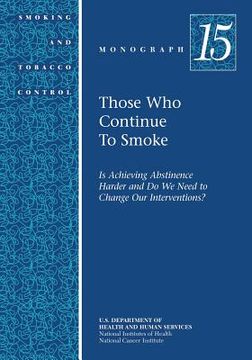Those Who Continue to Smoke: Smoking and Tobacco Control Monograph No. 15 (en Inglés)
Reseña del libro "Those Who Continue to Smoke: Smoking and Tobacco Control Monograph No. 15 (en Inglés)"
The decline in U.S. smoking prevalence since the publication of the first Surgeon General's Report in 1964 has been hailed as one of the greatest public health accomplishments of the past century. Forty four million Americans-almost half of those who ever smoked-have quit, and lung cancer death rates have decreased greatly as a result. As a nation, we've launched wide-reaching tobacco control programs in worksites, schools, communities, and all 50 states, and we've witnessed enormous shifts in social norms, policies, and public attitudes. Growth in clean indoor-air laws and smoking restrictions have made quit-smoking cues "persistent and inescapable", and new data shows that tobacco price increases and mass media cessation campaigns can significantly increase population quit rates. Over the last three decades, we have developed effective clinical treatments-psychosocial and pharmacological-and seen the publication and update of authoritative practice guidelines recommending evidence based treatments that, if universally applied, could double our national annual quit rate in a highly cost-effective way. Prospects for preventing and treating tobacco use and addiction have never been better. Yet the papers in this monograph, Those Who Continue to Smoke: Is Achieving Abstinence Harder and Do We Need to Change Our Interventions?, raise important questions about what it will take to build on the successes of the last century and, in particular, on the last few decades of research and practice. While efforts to promote tobacco cessation need to be part of a much broader national tobacco control strategy that emphasizes prevention, it is clear that the greatest gains in reducing tobacco-caused morbidity, mortality, and health care costs in the next 30 to 40 years will come from helping addicted smokers quit. Further declines in adult smoking are likely to strengthen prevention efforts as well, since adult smoking is a critical determinant of social norms and a vector for youth initiation. In this context, the findings presented in this monograph have important implications for the next generation of research and practice to help addicted smokers quit. Specifically, these papers and the findings they present indicate that helping more smokers quit will require: (1) developing more powerful treatments that can break through the 25% to 30% quit-rate ceiling achieved with our best existing treatments; (2) refining, targeting and tailoring treatments for high-risk populations; (3) greatly improving surveillance of quitting patterns and determinants; (4) developing combined clinical-public health approaches that harness synergies between evidence based clinical treatments, and macro-level policy and environmental cessation strategies; and (5) improving the use of and demand for treatments that work.

